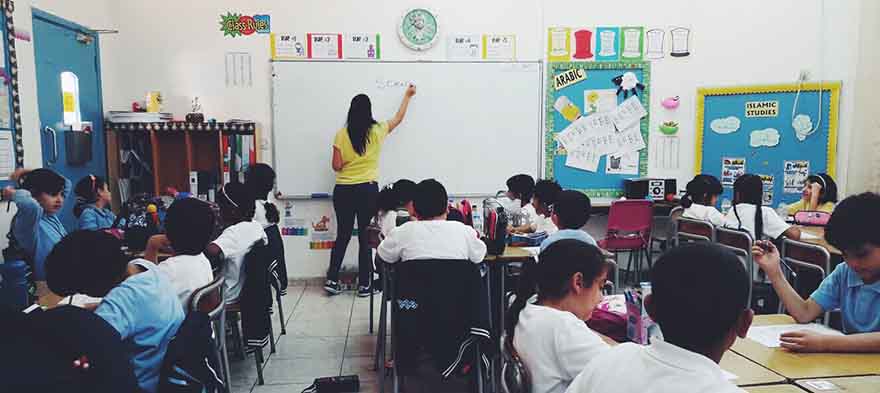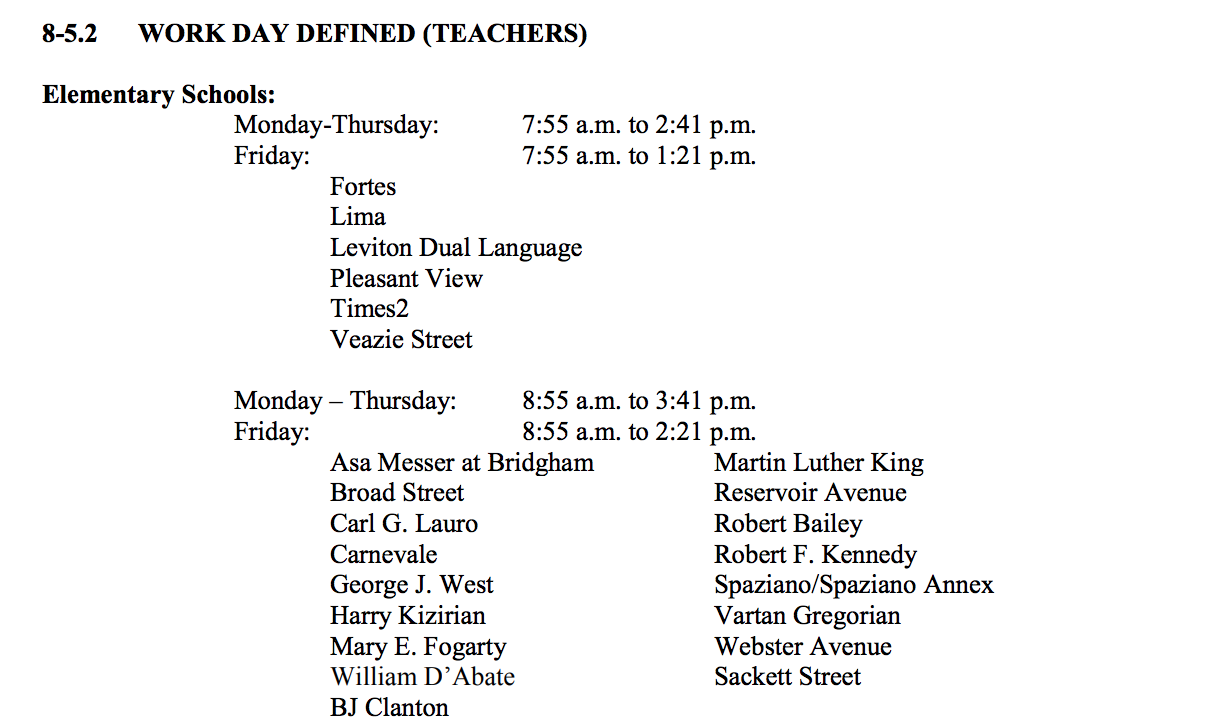
Feb 26, 2018 12:00:00 AM
by Erika Sanzi
 The most recent contract literally has the exact number of school days and the precise hours of the work day listed for every school in the city and there is zero variety when it comes to the length of the day or year. As it currently stands, extended learning time wouldn't even be possible under the current contract. But with negotiations underway (albeit stalled and contentious at the moment) it would be a great time for Providence to add some flexibility to the schedule, especially since we know that tremendous benefits can come with a longer school day. While it may not happen next year, this change to the contract would leave the door open for creative scheduling ideas that would better serve students and perhaps even teachers as they too could have more flexibility built into the day if the day were longer. Below is an example of what more flexible contract language could look like:
The most recent contract literally has the exact number of school days and the precise hours of the work day listed for every school in the city and there is zero variety when it comes to the length of the day or year. As it currently stands, extended learning time wouldn't even be possible under the current contract. But with negotiations underway (albeit stalled and contentious at the moment) it would be a great time for Providence to add some flexibility to the schedule, especially since we know that tremendous benefits can come with a longer school day. While it may not happen next year, this change to the contract would leave the door open for creative scheduling ideas that would better serve students and perhaps even teachers as they too could have more flexibility built into the day if the day were longer. Below is an example of what more flexible contract language could look like:
IV. School Day and Year A. Teachers shall devote the necessary time and effort to fulfill their professional obligations. For example, unless formally excused, teachers shall participate in all regular school functions during or outside of the normal school day, including faculty meetings, parent conferences, department meetings, curriculum meetings, graduations and other similar activities. Teachers shall be afforded a duty-free lunch period of at least Y minutes per day and teacher work schedules shall also allow for rest room breaks. Teachers will also be afforded regular preparatory time during their work week. Pursuant to the decision-making process set forth in Article VI below, such preparatory time may include common planning periods and professional development but will not include regularly assigned teaching duties. B. Work year. Teachers will report five (5) days prior to the arrival of students for the beginning of the school year and will work through the fifth work day after the student school year closes to allow for meaningful preparation for and assessment of the school year.Get Rid of Last in, First Out (aka LIFO). When layoffs are needed in school districts, seniority often drives the decisions about who stays and who goes. That is wrong. We must do everything in our collective power to ensure that we have the best teachers in front of all children. If there are two equally effective and talented and dedicated teachers then sure, keep the one who is more senior. But in the cases where the best teachers—and by best I mean the ones with whom students are learning and growing the most—are not the most senior, they must not be laid off. It is 100 percent antithetical to doing right by kids to maintain a policy that forces excellent educators out of the classroom while keeping mediocre (and even lousy ones) in front of students. And there is a reason why parents in at least five states have sued over this issue of LIFO—it hurts students and values years of service over student outcomes.
12-7 In the event that layoffs are necessary, teachers shall be notified no later than June 1 of the school year immediately preceding the school year in which the layoff is to become effective. Provided, however, that prior to implementing any layoffs resulting in staff reductions, the parties shall agree on the manner and criteria to be utilized in any staff reductions pursuant to layoffs. Consent to the methodology of layoffs shall not be unreasonably withheld. 12-7.1 The parties agree that for the duration of this Agreement, staff reductions shall be made pursuant to seniority within area of certification utilizing the teachers’ probationary date of employment. This provision shall expire and be of no further force and effect as of 11:59:00 p.m. on August 31, 2017. Upon the expiration of this provision but prior to the implementation of any layoffs resulting in staff reductions, the parties shall negotiate and agree upon the manner and criteria to be utilized in any staff reductions pursuant to layoffs. Consent to the methodology of layoffs shall not be unreasonably withheld.According to the now-expired contract, seniority-driven layoffs ended one minute before midnight on August 31, 2017, but it appears that "no layoffs resulting in staff reductions" can occur until "the parties negotiate and agree upon the manner and criteria to be utilized in any staff reductions pursuant to layoffs." Let's hope that the parties agree that teacher performance—to include student learning and outcomes, cultural competency, collegiality—must drive these difficult decisions. Something more like this:
Layoffs will be done among excessed teachers based on a rubric the District will disseminate at least ninety (90) days prior to the effective date of the layoffs. The rubric will be based on performance information such as evaluation ratings and unexcused teacher absence data, with seniority in license being the determinant where other indicators are equal.So, Mayor Elorza is correct. A transformational contract is precisely what the students (and staff!) of Providence schools need. It won't be easy—but no matter how hard it is, we can't afford to squander the opportunity to do things differently for Providence students and their teachers. More importantly, if he gets it done, he will be an example to every other city leader and superintendent out there who knows that a shorter, smarter and more flexible contract is needed if teachers are to be empowered and students are to be served well.
Erika Sanzi is a mother of three sons and taught in public schools in Massachusetts, California and Rhode Island. She has served on her local school board in Cumberland, Rhode Island, advocated for fair school funding at the state level, and worked on campaigns of candidates she considers to be champions for kids and true supporters of great schools. She is currently a Fordham senior visiting fellow.
The story you tell yourself about your own math ability tends to become true. This isn’t some Oprah aphorism about attracting what you want from the universe. Well, I guess it kind of is, but...
If you have a child with disabilities, you’re not alone: According to the latest data, over 7 million American schoolchildren — 14% of all students ages 3-21 — are classified as eligible for special...
The fight for educational equity has never been just about schools. The real North Star for this work is providing opportunities for each child to thrive into adulthood. This means that our advocacy...
Your donations support the voices who challenge decision makers to provide the learning opportunities all children need to thrive.
Ed Post is the flagship website platform of brightbeam, a 501(c3) network of education activists and influencers demanding a better education and a brighter future for every child.
© 2020–2024 brightbeam. All rights reserved.
Leave a Comment